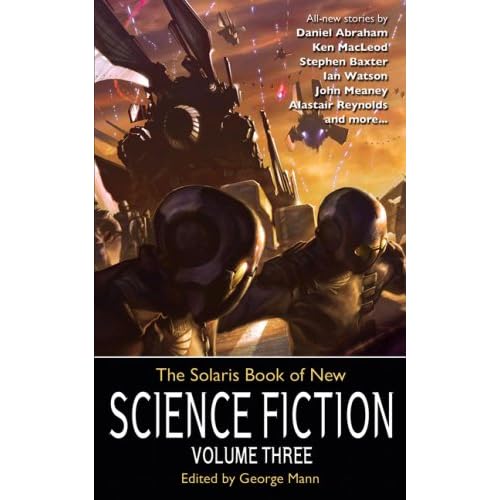 I wouldn't call The Solaris Book of New Science Fiction to be one of the strongest original, unthemed science fiction anthologies (not that there's a lot of them in the first place), but editor George Mann has managed to deliver a level of consistency, and this particular volume is no different. What's interesting with each volume is that Mann mixes up the selection of contributors as new authors enter the mix and produce stories that are distinct compared to the previous ones.
I wouldn't call The Solaris Book of New Science Fiction to be one of the strongest original, unthemed science fiction anthologies (not that there's a lot of them in the first place), but editor George Mann has managed to deliver a level of consistency, and this particular volume is no different. What's interesting with each volume is that Mann mixes up the selection of contributors as new authors enter the mix and produce stories that are distinct compared to the previous ones.There are fifteen stories in this book, most of them lengthy (Ken Macleod's "iThink, therefore I am" being the exception). The aims of each writer is varied, from Stephen Baxter's usage of hard science fiction concepts to adventure and espionage in the case of Ian Whates. At the very least, the selections are entertaining, and while not every story is impressive, each one succeeds--on a certain level--when it comes to its own goals.
The Solaris Book of New Science Fiction Vol. 3 actually caters to a wide set of science fiction readers, and there's probably a story or two that each reader will enjoy. Of course the flip-side to that is that because it's diverse, there's also probably a piece that's not to your particular liking, not due to weak writing but because it doesn't fall under your preferences. Here is this reader's three favorites:
"Providence" by Paul di Filippo manages to juggle several elements. On one hand, while it's told in a serious tone, there's a certain ludicrousness in the presentation of the story that's ripe for humor. The brilliance of the author is that when he finally introduces the MacGuffin, it is simultaneously ridiculous and philosophically poignant. A deeper reading that is a valid interpretation is how di Filippo uses robots as a metaphor for the human condition, and while the ending is a bit heavy-handed in execution, it supports this kind of reader interaction with the text.
"One of Our Bastards is Missing" by Paul Cornell is a fun and entertaining mystery romp filtered through a science fiction lens. Cornell knows how to develop tone and setting--and at the very least picks a compelling title--which is integral because while the plot isn't anything spectacular, the author convinces us because of the atmosphere he develops. A lot of the mystery formula can be found here: a seemingly-impossible scenario, a fair share of politics and intrigue, and your somewhat jaded protagonist. This isn't perhaps the most enlightening of stories but it's definitely exciting.
A piece that I want to particularly highlight is "The Best Monkey" by Daniel Abraham. The author uses a lot of techniques to make this a successful story. There's the language and tone, and the short excerpts explaining human behavior is appropriate. Abraham also isn't lacking in plot or theme as he raises a question that feels right at home in a science fiction story. And then there are the characters, which feel genuine whether they're the secondary characters or the protagonist. It's not that all these elements are elevated, but Abraham writes them competently to form a united whole.
Again, The Solaris Book of New Science Fiction Vol. 3 might not be the best science fiction anthology available, but it has its fair share of commendable stories and covers a wide set of topics. There are definite gems depending on your preference, and nonetheless worth checking out.
No comments:
Post a Comment